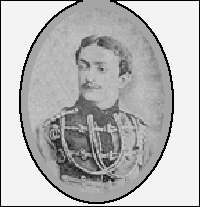 Prince André Dadian
Prince André Dadian
Prince Dadian was a chess player and chess benefactor along the same lines as Baron Albert Rothschild (who was
the patron of Kolisch and who financed the Vienna tournaments of 1873, 1882, 1898 and 1903).
[Mingrelia is a former principality in the western part of
Georgia (Gruzija), which is itself a former Soviet republic.]
I found eight games attributed to Prince Dadian and each one is a gem.
According to popular opinion, Prince Dadian, as a chess angel, seemed to like to use his influence to satisfy certain whims. But everything I've found is cloudy and far from conclusive.
Here are several versions of the same story:
According to Tim Krabée's site :
"The reasons Chigorin (Tchigorin) and Janowski did not play in Monte Carlo were due to disputes with the organizers," summarises Mr. McAllister. "Janowski had been involved in a dispute with the tournament manager De Riviere (I believe over the tournament schedule the previous year) and had indicated he would not accept an invitation for 1903 and was therefore not invited. Chigorin had been invited and travelled from Russia. However the president of the tournament (and provider of some of the prizes), Prince Dadian of Mingrelia, objected to him competing in the tournament and Chigorin was excluded. He was given compensation of 1500 Francs (more than the third prize)."
According to this source :
Prince Dadian was the..."sponsor of the 1903 Monte Carlo tournament. He invited Tchigorin (Chigorin) to play but later paid him 1,500 francs (greater than 3rd prize money) not to play because Tchigorin had published analysis of one of the Prince's games, pointing out he had made gross errors. A valuable art object was to go to the winner of a short match between the 1st and 2nd place finishers (Tarrasch and Maroczy). The players wanted a play for money also. This annoyed the Prince who gave the art object to the 3rd place finisher (Pillsbury)."
According to Anders Thulin on Goggle's chess history newsgroup ,"...some chess players refused to treat Dadian as chess royalty. Chigorin(Tchigorin)was one of those, and though he was invited to Monte Carlo 1903, and
accepted, and turned up at the tournament, Prince Dadian (president of the tournament committee) refused to remain president unless Chigorin was excluded. Wolf took his place instead. Odd that: this is the tournament in which the well-known Colonel Moreau appears, sometimes said to be a replacement for some player who could not attend. I wonder who that could be, if Wolf took Chigorin's place.
The explanation was that Chigorin had shown some kind of animosity against
Prince Dadian in the press. The exact nature of this offense seems unclear:
these articles were promised to be published to justify the exclusion of Chigorin,
but I don't know where that happened. (I suspect the original 'offense' was in
some Russian chess column or journal, as all accounts I've seen are similarly
hazy on just what caused this unexpected expulsion.) It is odd, though, that
Dadian's complaint seemed to go back for a long time, perhaps even a couple of
years, yet it was not until the very last second that it was publicly announced
in this rather astonishing manner. (Or was he not appointed president until the
very last moment?)
American Chess Weekly, on which I partly rely for this, does not seem to have
anything but gossip to go on, and Chigorin is there depicted as a rather
unfair critic, despite the lack of facts. Chigorin seems to have received
1500 francs as (complete?) reimbursement for his travel costs, though."
To demonstrate how unreliable the available "facts" are, Chigorin's place in the tournament had to be filled by another player (again, thanks to Anders Thulin):
"American Chess Weekly, 1903, Special Series 1 (April 29th, 1903), p. 2, says Wolf replaced Chigorin."
"Tidskrift för Schack, 1903:3 (March), agrees about Wolf."
"BCM, 1903 p. 160, says Colonel Moreau was the substitute." (BMC=British Chess Magazine)
Then, according to Charles Blair (same chess history posts):
"In GUINESS CHESS: THE RECORDS, K. Whyld claims that Colonel Moreau was a last minute (0-14?) substitute for Chigorin."
Unfortunately, the rumors don't stop there. If you play through the games of Prince Dadian, you'll think these games are too good to be true...and you might be right.
The most prevalent thought today is that Prince Dadian pre-arranged the moves of his games against masters, allowing him to win in brilliant style for a fee.
This makes sense if you look at his games and wonder why there aren't volumes of them. However, his games are found in many collections, even those compiled by knowledgeable players and historians during a time when the shady exploits of Dadian should have been commonly known. If it were in fact true, it would seem that these people would have known about them and would not have listed his games in their collections.
Nothing is clear, but it's all food for thought.
|
 Prince André Dadian
Prince André Dadian